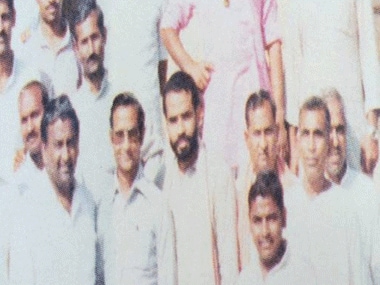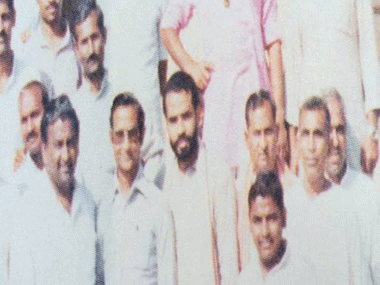Editor’s note:As readers of this series will know, Narendra Modi was trained in Gujarat by a series of Marathi, mostly Brahmin, workers of the RSS. He picked up various aspects of his style from them, amd their devotion and simplicity moved him deeply. On reading the book he wrote about them, called Jyotipunj, one can understand why Modi spent his whole life with the RSS. In this chapter, Modi profiles Vasudevrao Talwalkar, who was as uncaring about his own life and habits as he was careful and meticulous about his work for the Sangh. When one spoke to Vasudevrao Talwalkar, one got the flavour of Gujarati spoken with an actual Kathiawadi accent. He may have been from a Maharashtrian background but he eventually lived a purely Bhavnagari life. [caption id=“attachment_1355897” align=“alignleft” width=“380”]  A young Modi during his years with Vasudevrao Talwalkar.[/caption] He had a job in the railways there, but he was occupied less in his work than with his studies and his responsibilities in the Rashtriya Swayamsevak Sangh. Put another way, he was possessed by the spirit of the RSS. He was for many years a foot-soldier in the Bhavnagar Shakha, but was never satisfied with his life. Despite spending hours in social work he was always troubled by questions of what else he should be doing. Bhavnagar is a city of culture, and literature is a part of its ethos. This gave Vasudevrao an idea: That this culture ought to be brought to ordinary families. And so he thought of putting up a public reading room. Rather than go about raising money, he went to well-to-do families and asked them to particularly donate such books as inspired nationalism. With these second-hand books and magazines he opened a little library and reading room. A group soon formed of those who were interested in this sort of thing. Slowly the reading turned to nation-worship (Rashtrabhakti) and because of this it also helped expand the work of the RSS in the city. Vasudevrao got no joy from his day job. In those days, a job in the railways was the equivalent of an airlines or telecom assignment today, but such things didn’t affect him in the least. Another person might have worked on how to keep this job; Vasudevrao was always thinking of how to chuck it. This was no small thing for someone in his youth whose family had expectations. But Vasudevrao had made up his mind to devote his life to the nation through the Sangh. And so he quit his Railways job, and his house and threw himself into working for the nation. He was always interested in reading, and was comfortable with English texts. On a bus or a train he was usually engrossed in some or the other text. He strived to develop himself through this. He spent much time as a Pracharak in different parts of Saurashtra. As someone who was hardworking and diligent he earned the respect of many. And he ran up and down Junagadh’s Girnar mountain in a contest as if it were part of his RSS routine. He had one special attribute, and he was quite different in this way from others who lived the RSS life. He was utterly carefree like a Sufi (Awliya). Uncombed hair, no care to his manner of dress, glasses with ultra thick-lenses, torn chappals… Everything about him was thus. Though he was like this about his personal life, in his Sangh life he was exactly the opposite. Meticulous and detail-oriented and proper at all times. He insisted in the Sangh on protocol and proper methods and on punctuality. Everything else - from bathing, to mealtime, to reading newspapers, to bedtime - happened when it happened. When we could hear the sound of clothes being washed at 1 am we would know that it was Vasudevrao who, having finished his duties, finally had some time for his chores. In those years, in the Sangh’s primary team, Anantraoji was famous for his beautiful voice, while Vasudevrao was innocent of melody and rhythm. But in the RSS, there is a special place for Sangh-songs. They bind and inspire the teams, as social singing is meant to do. And so, despite being aware of his lack of ability, he would insist on the songs being sung with gusto. This brought the feeling of nation-worship to many youth. The RSS is all about such things as collective introspection, collective responsibility and collective decision-making. In some ways this is the strength of the RSS and so there is much time devoted to meetings. The smallest detail is examined and picked apart in these meetings, and this is an RSS tradition. At these gatherings, Vasudevrao would inevitably introduce fresh thinking and frequently change the direction. Till a decision was reached he kept putting his views forward excitedly. Sometimes a thing that was unfavourably viewed in the beginning would be adopted later because of him. Often the meetings would be extended, and people gathered specially to listen to him. Some long RSS meetings tend to get boring. When I am in one of them, I always remember Vasudevrao. His interventions would make any meeting, no matter how dull the subject, come alive. He was also quick-witted. Once Vakilsaheb Lakshmanrao Inamdar (another of Modi’s mentors) was Prantpracharak and conducting a meeting. It came up that Vasudevrao had been tardy in his correspondence. Pat came the reply: “Vakilsaheb, these days the amount of mail exchanges in the Sangh has gone up so much that I’ve decided as follows. Printed cards don’t need to be opened, typed cards may be opened but left unread and handwritten ones, which presumably are urgent, must be read and responded to immediately.” This humorous formulation entertained all of us and even Vakilsaheb was rolling with laughter. Vasudevrao’s means of transport was bicycle, bus and train. We tried to get him to learn to drive a car and ride a motorcycle but failed. At the age of 65 he could be seen on his cycle, though he would arrange for a scooter or motorbike for those junior to him. Most of his life he spent in Saurashtra. After many years, South Gujarat was handed to him as his charge. Once we were discussing the new area of his responsibility. He defined the difference between Saurashtra and South Gujarat. In the former, when two vehicles collided, even if no damage at all was done, the two men would get down and begin to fight it out. In South Gujarat (meaning the Surat area), even if the two vehicles were totalled in a collision, both drivers would get off and say together: “Look man, both of us seem to be at fault here.” And soon enough, things would be so quiet that one would thing nothing had happened. In his work for the RSS, he was singleminded as no other. He was like Arjun, and his eye was trained on one thing alone - Sangh-work. His lack of care for himself hurt his body and he was afflicted with severe ailments of the stomach. But even those close to him had no knowledge of this. So devoted he was to his work that the ailment could not slow him. He spent most of his years in Saurashtra and many families here were eager to care for him, but he went to Bharuch to get himself treated. Even when bedridden, if he thought he could have a couple of relatively painless days, he would take up some task. This was high class devotion to duty. He remained like this, living for the RSS, till his end came. An entire generation of those whom he raised in the Sangh misses him today. And we, who were sheltered in the shadow of this gigantic tree, are forever indebted to him.
An entire generation of those whom Vasudevrao Talwalkar raised in the Sangh misses him today. And we, who were sheltered in the shadow of this gigantic tree, are forever indebted to him.
Advertisement
End of Article
Written by Aakar Patel
Aakar Patel is a writer and columnist. He is a former newspaper editor, having worked with the Bhaskar Group and Mid Day Multimedia Ltd. see more


)
)
)
)
)
)
)
)
)



